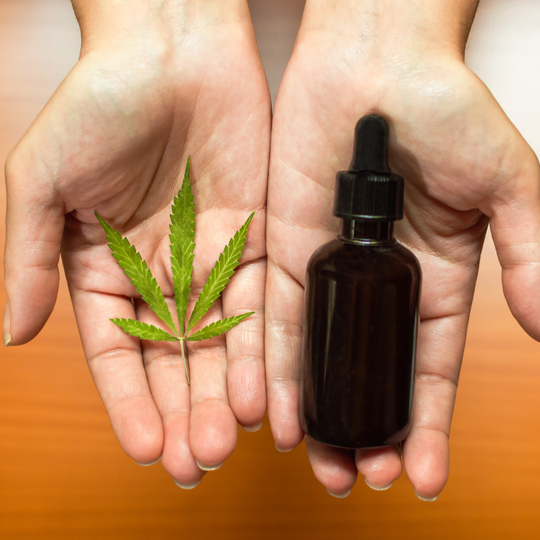Exploring the Synergy: Beta-Caryophyllene and CBD

In recent years, the spotlight on cannabinoids has intensified, with CBD (cannabidiol) emerging as a popular and widely researched compound. However, amidst the vast array of cannabinoids, another player, beta-caryophyllene, has started to gain attention for its intriguing similarities to CBD. In this blog post, we'll delve into the world of beta-caryophyllene and explore how it shares certain characteristics with CBD.
Understanding Beta-Caryophyllene:
Beta-caryophyllene (BCP) is a sesquiterpene found in a variety of plants, including cannabis, black pepper, and cloves. Unlike cannabinoids, which interact with the endocannabinoid system (ECS), BCP engages with CB2 receptors, which are primarily located in the peripheral organs and immune cells. This unique interaction has sparked interest in its potential therapeutic benefits.
The CB2 Receptor Connection:
One of the striking similarities between beta-caryophyllene and CBD lies in their interaction with CB2 receptors. While CBD doesn't directly bind to CB1 or CB2 receptors, it does influence these receptors indirectly, affecting the endocannabinoid system. On the other hand, beta-caryophyllene specifically binds to CB2 receptors, triggering a cascade of physiological responses.
Anti-Inflammatory Properties:
Both beta-caryophyllene and CBD are renowned for their anti-inflammatory properties. Inflammation is a common denominator in various health conditions, and both compounds have demonstrated the ability to modulate inflammatory responses. This shared characteristic has led researchers to explore the potential synergistic effects of combining these compounds for enhanced anti-inflammatory action.
Neuroprotective Potential:
CBD has garnered attention for its neuroprotective properties, which have been studied in the context of conditions such as epilepsy and neurodegenerative diseases. Similarly, beta-caryophyllene has shown promise in protecting the nervous system, with studies suggesting potential applications in the treatment of neuropathic pain and other neurological disorders.
Anxiolytic Effects:
Anxiety is a prevalent condition affecting millions of people worldwide. Both CBD and beta-caryophyllene have been investigated for their anxiolytic (anxiety-reducing) effects. While the mechanisms of action may differ, the potential for alleviating anxiety suggests a shared trait between these two compounds.
Legal Status and Accessibility:
One notable difference between beta-caryophyllene and CBD is their legal status. CBD, derived from hemp, is legal in many regions, provided it contains less than 0.3% THC. Beta-caryophyllene, as a terpene, is generally regarded as safe and legal. It is commonly found in various plants and essential oils, making it easily accessible.
In the world of cannabinoids and terpenes, beta-caryophyllene stands out for its intriguing similarities to CBD. Both compounds exhibit anti-inflammatory, neuroprotective, and anxiolytic properties, albeit through different mechanisms. As research into these compounds progresses, the potential synergy between beta-caryophyllene and CBD could pave the way for novel therapeutic interventions. Whether used individually or in combination, these compounds offer exciting prospects for those seeking natural alternatives for various health concerns.
Understanding Beta-Caryophyllene:
Beta-caryophyllene (BCP) is a sesquiterpene found in a variety of plants, including cannabis, black pepper, and cloves. Unlike cannabinoids, which interact with the endocannabinoid system (ECS), BCP engages with CB2 receptors, which are primarily located in the peripheral organs and immune cells. This unique interaction has sparked interest in its potential therapeutic benefits.
The CB2 Receptor Connection:
One of the striking similarities between beta-caryophyllene and CBD lies in their interaction with CB2 receptors. While CBD doesn't directly bind to CB1 or CB2 receptors, it does influence these receptors indirectly, affecting the endocannabinoid system. On the other hand, beta-caryophyllene specifically binds to CB2 receptors, triggering a cascade of physiological responses.
Anti-Inflammatory Properties:
Both beta-caryophyllene and CBD are renowned for their anti-inflammatory properties. Inflammation is a common denominator in various health conditions, and both compounds have demonstrated the ability to modulate inflammatory responses. This shared characteristic has led researchers to explore the potential synergistic effects of combining these compounds for enhanced anti-inflammatory action.
Neuroprotective Potential:
CBD has garnered attention for its neuroprotective properties, which have been studied in the context of conditions such as epilepsy and neurodegenerative diseases. Similarly, beta-caryophyllene has shown promise in protecting the nervous system, with studies suggesting potential applications in the treatment of neuropathic pain and other neurological disorders.
Anxiolytic Effects:
Anxiety is a prevalent condition affecting millions of people worldwide. Both CBD and beta-caryophyllene have been investigated for their anxiolytic (anxiety-reducing) effects. While the mechanisms of action may differ, the potential for alleviating anxiety suggests a shared trait between these two compounds.
Legal Status and Accessibility:
One notable difference between beta-caryophyllene and CBD is their legal status. CBD, derived from hemp, is legal in many regions, provided it contains less than 0.3% THC. Beta-caryophyllene, as a terpene, is generally regarded as safe and legal. It is commonly found in various plants and essential oils, making it easily accessible.
In the world of cannabinoids and terpenes, beta-caryophyllene stands out for its intriguing similarities to CBD. Both compounds exhibit anti-inflammatory, neuroprotective, and anxiolytic properties, albeit through different mechanisms. As research into these compounds progresses, the potential synergy between beta-caryophyllene and CBD could pave the way for novel therapeutic interventions. Whether used individually or in combination, these compounds offer exciting prospects for those seeking natural alternatives for various health concerns.
